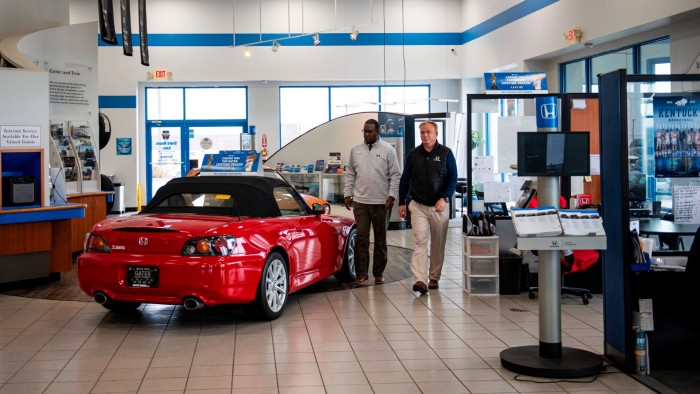Showrooms at US car dealerships have been humming as buyers rush to get new vehicles before President Donald Trump’s new tariffs kick in, but dealers worry the good times are about to come to a screeching halt.
If carmakers raise prices to pass the cost of tariffs to dealers and consumers, that could cause sales to fall by a fifth, said chief executive John Crane, whose Hawk Auto Group has 12 locations in Illinois, selling 17 domestic and international brands.
His sales representatives are calling every customer with a car on order suggesting they visit the dealership soon to buy one off the lot.
“When prices go up, sales go down,” Crane said. “There’s nothing we can say that’s going to make that any less painful, but we’ll do our best.” Sales volume has declined over the past eight years as the average cost of a car has risen, he said.
Trump is set to impose 25 per cent tariffs starting this week on vehicles built in Europe, Japan or South Korea. Cars and parts from Mexico and Canada will also be levied with 25 per cent tariffs, hitting more than a dozen carmakers with operations there, including the traditional Detroit three.
The additional cost will vary based on model and manufacturer. Michigan consultancy Anderson Economic Group has estimated the tariffs will add between $4,000 and $10,000 to the cost of most vehicles, and about $12,000 to the cost of an electric vehicle.

That additional cost will be absorbed by some combination of carmakers, dealers and consumers. Stephen Brown, analyst at Fitch Ratings, said carmakers will need to decide how much of the increase to pass along, or whether to prune unprofitable models from the line-up entirely, because they cannot immediately change where they build their products.
“You can’t build new plants overnight,” he said.
Sales numbers suggest that consumers are buying. Ford on Tuesday reported first-quarter retail sales increased 5 per cent, propelled by March volume that was 19 per cent higher than year-ago levels. General Motors’ retail sales increased 15 per cent in the first three months of the year.
Edison Yu, analyst at Deutsche Bank, estimated that the US sales rate in March was up “materially” from both February and March 2024. But he cut his sales forecast for 2025 because he expects purchases to slow.
“With tariffs now seemingly official, we expect April/May sales to actually be robust as consumers buy ahead of prices rising but then weaken in [the second half of the year] once higher costs begin flowing through,” Yu said.
John Murphy, analyst at Bank of America, said the increased cost from tariffs could reduce US car sales by up to 3mn, which would be 20 per cent of the 15.9mn sold last year.
Share prices for publicly traded dealerships have plummeted in the past month. Oregon-based Lithia Motors, with more than 450 locations and a market cap of $7.8bn, has fallen 16 per cent to $296.83. Competitors fell between 12 per cent and 18 per cent.
The publicly traded dealers, because of their size and diverse portfolio of nameplates, have more ability to absorb costs than smaller operations, said David Harkins, vice-president at business valuation firm Mercer Capital. Still, the tariffs are “clearly a negative for anyone involved”.
“I’m glad I’m not in the market to buy a new car right now,” he added.
Crane said he planned to weather a potential downturn in sales by delaying expansion plans at several locations and refinancing loans “to make sure we have some extra cash”.
But some dealers will need to “make tough decisions” about how many people they employ if car sales drop, Mike Stanton, chief executive of the National Automobile Dealers Association, said during a livestream on X on Monday.
Andrew Wright, managing partner at Vinart Dealerships in Pennsylvania, said during the same livestream that he wanted to know how carmakers would respond if demand for new cars falls. He noted that when there was a sharp drop in demand during the Covid-19 pandemic, manufacturers churned out fewer vehicles, matching supply to demand and keeping prices elevated.
“My concern is we’re going to end up with a ton of supply in a higher tariff environment, there’s not going to be enough demand to relieve that supply,” he said.
Recommended
Some dealers are optimistic Trump’s administration could offset a drop in demand through other means, whether through influencing the Federal Reserve to lower interest rates or pushing Congress to pass legislation making interest on car payments tax-deductible, such as mortgage interest.
“We never had an administration with this type of business-friendly acumen,” said Michael Speigl, dealer at We Auto in Michigan, during the livestream. “To think that they’re just going to drive us right off an economic cliff is, I think, maybe a little bit presumptuous. It just seems like there are a lot of other things that are going to play out between interest rates and taxes.”
But Steve Gates of Gates Auto Family said the tariffs could be “disastrous” for the business his grandparents started more than a century ago, which now has 11 showrooms spread across Kentucky, Indiana and Tennessee, selling Toyota, Hyundai, Kia and Ford/Lincoln.
The tariffs have the potential to put some dealers out of business, he said. At current interest rates, an extra $1,000 in sticker price drives up a car payment by $20, and higher payments cost dealers sales when they push the payment outside a car shopper’s budget.
“It kills us,” he said. “It doesn’t hurt us, it kills us. If this goes on for a long period of time, there will be some dealers who can’t make it or will decide it’s just not worth the trouble any more.”



